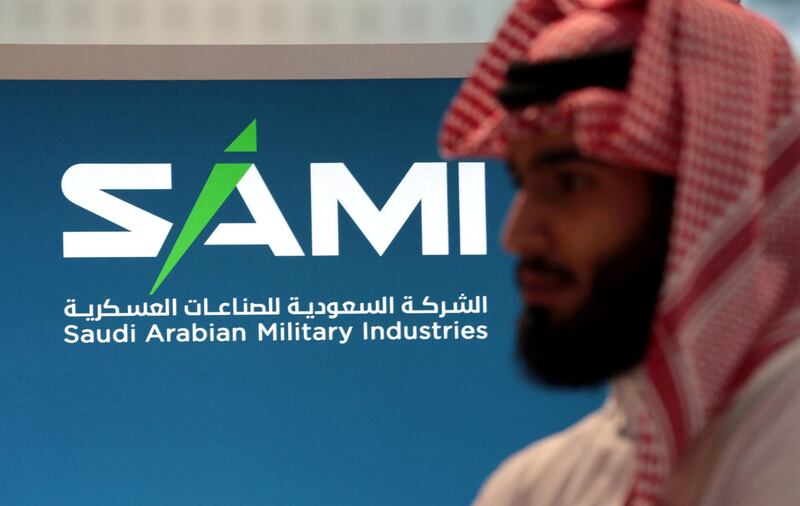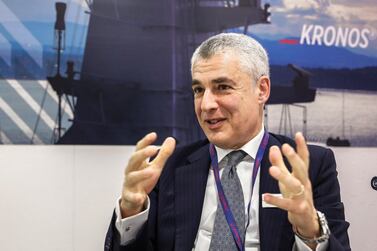State-run Saudi Arabian Military Industries (Sami) is planning a multi-billion dollar acquisitions and joint ventures spree this year with a target of reaching $10 billion in sales by 2025 as part of the kingdom’s push to localise military spending.
The firm will spend $1bn to acquire existing defence-related companies in the kingdom that fit with its portfolio to consolidate them under its umbrella by the end of 2019, Andreas Schwer, chief executive of Sami, told The National on the sidelines of the International Defence and Exhibition Conference (Idex) in Abu Dhabi. It is "carefully scanning" international markets for at least one global acquisition by year-end in one of its focus areas of aeronautics, land systems, defence and missiles to localise production and technology transfer.
“We believe we can achieve our target of becoming one of the top 25 defence contractors worldwide," he said. “It should be possible to be in top 10.”
Saudi Arabia's sovereign wealth fund, the Public Investment Fund, created Sami in 2017 to help cut the country's reliance on foreign arms purchases. As part of the country's Vision 2030 plan for economic and social diversification, Sami's mandate is to localise more than half of the kingdom’s total military spending, up from about 2 per cent currently.
The PIF-owned company is planning multi-billion dollar investments in 25 to 30 joint ventures over the next few years to build capabilities in shipyards, aircraft assembly lines and other infrastructure, Mr Schwer said.
More than 20 JVs are underway, with three already finalised, 17 more expected to be closed in the first quarter, and five in the second half of this year. By the end of 2019, global partnerships with companies from the US, western Europe, Asia and South Africa will be set up, spanning production to after-sale services.
Acquisitions and joint ventures will be financed through PIF primarily and also through government programs that provide grants related to its activities in the framework of Vision 2030, Mr Schwer said.
The company is targeting 30 per cent of its revenues from exports and aims to begin foreign sales by 2020, he said. Sami sees potential opportunities for exports of ammunition, weapons and naval.
Orders for export sales are already lined up with some based in the Gulf and others in the Far East, Mr Schwer said. Sami will not enter into business agreements with Russia because of US sanctions.
“Sami, by its constitutions, cannot collaborate with any country or company which is subject to sanctions or embargo as such we cannot do any kind of business with any Russian entity,” he said.
The executive said Saudi Arabia has a defence budget of $70bn in addition to security-related spend of about $30bn.
The company, which started operations in 2018, has set an ambitious target to become profitable by the end of 2020, he added.
Sami is starting the execution of its contracts and expects its revenues in 2019 to be a “very moderate figure", according to Mr Schwer.
The Saudi firm earlier signed an aerospace and defence agreement for a joint venture with Abu Dhabi’s Mubadala Investment Company to build aircraft components for military and commercial purposes.
It will have further partnership agreements with other major UAE entities in the next three months covering other areas, Mr Schwer said without elaborating.
“We want to set up a kind of complementary defence industry to avoid redundancy and to be in a position to collaborate and help each other and to go even for common procurement programmes,” he said. “We want to benefit from economy of scale.”
The Saudi government has cut its defence budget in 2019 for a second time but Mr Schwer said Sami was unaffected by the 12 per cent reduction in spending.
Separately on Monday, Sami and Spanish shipbuilder Navantia announced a joint venture agreement to deliver combat management systems.
The Sami Navantial Naval Industries (Sanni) venture, in which Sami will have a 51 per cent shareholding and Navantia the remaining 49 per cent stake, will integrate the systems in the Saudi navy’s corvettes, Antonio Rodrigues, chief executive of Sanni, said at Idex.
Sanni will start talks for exports to navies of “allied countries” in the Middle East, he said.
“Sanni was born to be an export-oriented company,” Mr Rodrigues said.
Also on Monday, Sami and US defence company L3 Technologies signed a preliminary agreement to explore collaboration on projects related to the electro-optical/infrared and special mission systems markets in the kingdom.
Sami and L3 will focus on working together on sustaining, training, manufacturing, and research and development, as well as pursuing "strategic opportunities”, the Saudi company said. No financial terms were disclosed.
Sami’s activities will create 40,000 direct jobs and more than 150,000 indirect jobs by 2030.







